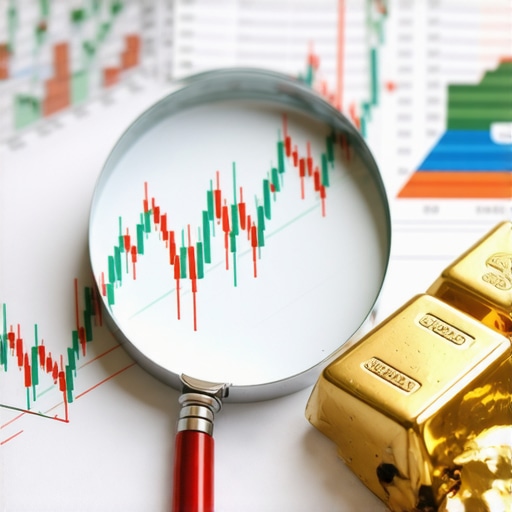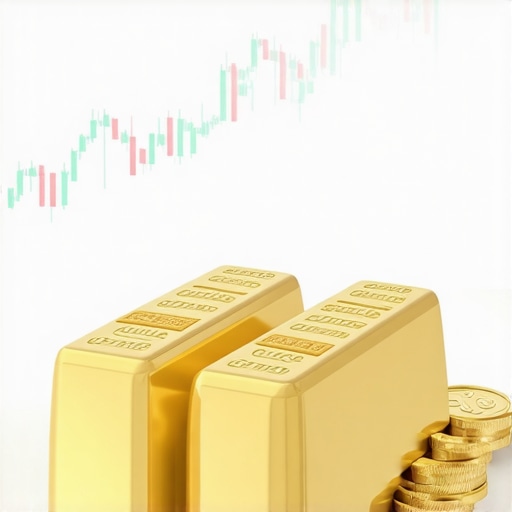Understanding the Role of Central Banks in Gold Demand
Gold has been a traditional store of value and a safe haven investment for centuries. However, the impact of central bank purchases on gold demand is a crucial aspect that many investors may overlook. Central banks, as the institutions responsible for managing a nation’s currency, money supply, and interest rates, play a significant role in influencing the gold market. Their actions can lead to fluctuations in gold prices and affect investor sentiment.
How Do Central Bank Purchases Affect Gold Prices?
When central banks buy gold, they are often acting to diversify their reserves away from fiat currencies. This action can create an increased demand for gold, leading to price appreciation. For instance, according to a report from the World Gold Council, central bank purchases in recent years have significantly influenced gold prices. In times of economic uncertainty, such as during financial crises or geopolitical tensions, central banks tend to increase their gold reserves to safeguard against currency devaluation, thereby driving up gold demand.
Why Are Central Banks Increasing Their Gold Holdings?
Several factors contribute to the growing trend of central banks accumulating gold. First, gold is seen as a hedge against inflation and currency risk. In a world where inflation can erode the purchasing power of fiat currencies, central banks view gold as a stable asset. Second, the geopolitical landscape can prompt central banks to secure gold as a safeguard against potential economic sanctions or crises.
What Are the Implications for Investors?
For investors, understanding the impact of central bank purchases on gold demand is essential for making informed decisions. When central banks increase their gold holdings, it often leads to a bullish sentiment in the market. Investors might consider investing in physical gold or exploring gold-related investment vehicles such as ETFs and mutual funds. This trend can signal a shift in market dynamics, emphasizing the importance of staying informed about central bank actions and global economic conditions.
In conclusion, the influence of central bank purchases on gold demand cannot be underestimated. As these institutions continue to adapt their strategies to navigate economic challenges, their decisions will undoubtedly shape the future of gold prices. Stay updated on these trends to enhance your investment strategy.
What are your thoughts on the increasing role of central banks in gold demand? Share your insights in the comments below!
Understanding the Effects of Global Economic Trends on Gold Demand
As central banks continue to purchase gold, the interconnectedness of global economic trends becomes increasingly apparent. The demand for gold is not only influenced by these purchases but also by macroeconomic factors such as inflation rates, interest rates, and geopolitical stability. For instance, during periods of high inflation, investors often flock to gold as a safe haven, which can further amplify the effects of central bank buying on prices.
How Do Economic Conditions Influence Gold Demand?
Economic conditions play a pivotal role in shaping gold demand dynamics. According to Wikipedia, gold has historically been viewed as a hedge against economic downturns and currency devaluation. When economies face uncertainty, central banks typically increase gold reserves, further driving up demand. This creates a feedback loop; as demand rises, so do prices, attracting more investors to the gold market.
Assessing the Long-Term Implications of Central Bank Gold Purchases
The implications of central bank gold purchases extend beyond immediate market reactions. For long-term investors, understanding these trends is crucial for developing effective strategies. Central banks’ increasing gold holdings signal a potential shift in monetary policy and market stability, which can affect investment decisions across various asset classes.
What Should Investors Consider About Central Bank Gold Policies?
Investors should closely monitor central bank policies regarding gold purchases as these strategies can indicate broader economic trends. For example, if a major central bank announces a significant increase in its gold reserves, it might suggest a lack of confidence in fiat currencies or a response to rising inflation. This can create opportunities for investors looking to capitalize on potential price movements in gold. Additionally, exploring investments in gold ETFs or mutual funds that track gold prices may be beneficial during such times.
Furthermore, understanding the historical context of central banks’ gold purchasing behavior can offer insights into future trends. As noted by the World Gold Council, analyzing past data can help investors anticipate how current economic conditions might influence future central bank actions.
Are you interested in learning more about how to navigate the complexities of gold investments? Share your thoughts or questions in the comments below, and check out our article on gold price forecasts for more insights!
Analyzing the Future of Gold Demand Amid Economic Challenges
As we look towards the future, it’s essential to consider how ongoing economic challenges will shape the demand for gold. With central banks actively increasing their gold reserves, investors need to stay informed about the potential implications. Economic uncertainties, such as inflation and geopolitical tensions, often drive demand for gold, making it a crucial asset in times of crisis.
How Will Inflation Impact Gold Demand in 2025?
The correlation between inflation rates and gold demand is well-documented. According to the Bureau of Labor Statistics, inflation influences purchasing power, driving investors towards gold as a protective measure. As inflation rises, so does the appeal of gold, which is traditionally seen as a hedge against currency devaluation. Investors should prepare for a scenario where continuous inflation could lead to heightened gold purchases by both central banks and private investors.
The Role of Geopolitical Stability in Gold Investment Strategies
Geopolitical factors significantly affect gold demand. During periods of unrest or uncertainty, gold often emerges as the preferred safe haven. This trend has been observed repeatedly in history, where investors flock to gold in response to global crises. Understanding the geopolitical landscape is vital for investors seeking to capitalize on potential gold market fluctuations.
People Also Ask: What Factors Drive Geopolitical Demand for Gold?
Several factors contribute to the geopolitical demand for gold. Firstly, political instability can lead to currency fluctuations, prompting central banks to increase their gold holdings to stabilize their economies. Additionally, trade wars and sanctions can amplify the need for gold as a secure asset. Investors should monitor global political events closely, as these developments can directly impact gold prices and demand.
Strategic Investment Approaches for 2025
For savvy investors, developing a strategic approach to gold investment is crucial. Diversifying your portfolio with gold ETFs, mutual funds, or direct physical gold investments can help mitigate risks associated with economic volatility. As central banks continue to influence the gold market, being proactive in your investment strategy can enhance your potential for returns.
Moreover, keeping an eye on central bank policies and their gold purchasing trends will provide valuable insights into future market directions. Understanding how these institutions operate can guide investors in making informed decisions about their gold investments.
In conclusion, the future of gold demand is intertwined with economic trends and central bank strategies. By staying informed about inflation, geopolitical stability, and central bank actions, investors can position themselves effectively in the gold market. What are your thoughts on the future of gold as an investment? Feel free to share your insights in the comments below, and check out our article on gold price forecasts for further insights into the evolving market dynamics.
Evaluating the Impact of Geopolitical Events on Gold Demand
As we navigate through an increasingly complex geopolitical landscape, the demand for gold continues to be influenced by various global events. Investors should be aware that geopolitical tensions, trade disputes, and political instability can significantly drive the price and demand for gold. Understanding these factors can help investors make informed decisions regarding their gold investments.
What Global Events Influence Gold Demand?
Several global events can create fluctuations in gold demand. For example, conflicts and wars often lead to increased demand for gold as a safe haven asset. According to Reuters, during heightened geopolitical tensions, investors tend to flock to gold, pushing prices higher. Additionally, economic sanctions imposed on countries can lead to currency instability, prompting both central banks and individuals to increase their gold holdings.
Understanding the Role of Inflation in Gold Demand
Inflation remains a critical factor that influences gold demand. As inflation rates rise, the real value of currency diminishes, leading investors to seek out gold as a hedge against the erosion of purchasing power. This relationship between inflation and gold demand has been historically documented, making it essential for investors to monitor inflation trends closely.
How Can Investors Prepare for Inflation’s Impact on Gold?
To prepare for potential inflation, investors should consider diversifying their portfolios with gold assets, whether through physical gold, ETFs, or mutual funds. By including gold in their investment strategy, they can mitigate risks associated with inflationary pressures. Furthermore, staying informed about economic indicators can help investors anticipate inflation trends and adjust their strategies accordingly.
Proactive Strategies for Gold Investment in 2025
As we look ahead to 2025, developing proactive investment strategies is crucial for success in the gold market. Investors should focus on maintaining a balanced portfolio that includes gold, especially during uncertain economic times. Additionally, understanding the historical context of gold prices can provide valuable insights into future market movements.
Engaging with professional financial advisors who specialize in precious metals can also enhance investment strategies. Their expertise can guide investors through the complexities of the gold market, ensuring informed decision-making.
People Also Ask: How to Stay Informed About Gold Market Trends?
Staying informed about gold market trends is essential for any investor. Regularly following reputable financial news sources, subscribing to market analysis reports, and participating in investment forums can provide valuable insights. Additionally, reviewing the latest research from organizations such as the World Gold Council can help investors understand current demand trends and forecasts.
In conclusion, understanding the multifaceted influences on gold demand, including geopolitical events and inflation, is vital for strategic investment planning. By staying informed and adapting to market changes, investors can position themselves effectively in the evolving gold landscape. What strategies are you considering for your gold investments in the coming years? Share your thoughts below and explore our comprehensive guide on approaching gold market analysis for deeper insights.
Frequently Asked Questions (FAQ)
How does inflation impact gold prices?
Inflation typically increases gold prices as it erodes the purchasing power of currency. Investors often turn to gold as a hedge against inflation, leading to higher demand and consequently higher prices.
What are the best ways to invest in gold?
Investors can invest in gold through various means, including physical gold (bars or coins), gold ETFs, and gold mutual funds. Each method has its advantages and risks, so it’s essential to assess personal financial goals before investing.
How do geopolitical events affect gold demand?
Geopolitical events such as wars, political instability, and trade disputes can drive up gold demand as investors seek safe-haven assets. During times of uncertainty, gold prices often rise as more people invest in it for security.
What should I know about gold ETFs vs. physical gold?
Gold ETFs are investment funds that track the price of gold and are traded on stock exchanges, offering liquidity and ease of trading. Physical gold, while a tangible asset, requires secure storage and insurance. Each option has its pros and cons based on investor preferences.
What role do central banks play in the gold market?
Central banks are significant players in the gold market as they buy gold to diversify reserves and hedge against inflation and currency risks. Their purchasing decisions can drive demand and influence gold prices globally.
Are gold mutual funds a good investment?
Gold mutual funds can be a good investment for those looking to gain exposure to gold without the complexities of holding physical gold. They typically invest in gold mining companies or gold-related assets, providing diversification and professional management.
How can I track gold market trends?
Investors can track gold market trends by following financial news outlets, market research reports, and institutions like the World Gold Council. Regular updates on economic indicators and geopolitical events can also provide insights into gold price movements.
What are the long-term prospects for gold investment?
The long-term prospects for gold investment remain positive, especially as economic uncertainties persist. Factors such as inflation, currency fluctuations, and geopolitical tensions may continue to drive demand, making gold a valuable part of a diversified investment portfolio.
How does the dollar’s strength affect gold demand?
The strength of the U.S. dollar inversely affects gold demand; when the dollar weakens, gold becomes cheaper for foreign investors, increasing demand. Conversely, a strong dollar can diminish gold’s attractiveness as an investment.
Authoritative Sources
1. World Gold Council – A leading authority on gold and its market dynamics, providing extensive research and reports on gold demand and investment strategies.
2. Bureau of Labor Statistics – This source offers valuable data on inflation rates and economic indicators that directly influence gold prices.
3. Reuters – A reputable news agency that covers market trends and geopolitical events affecting gold demand.
Conclusion
In summary, understanding the factors influencing gold demand, including central bank purchases, inflation, and geopolitical stability, is crucial for making informed investment decisions. As gold continues to be a vital asset in times of uncertainty, staying updated on market trends and economic indicators will enhance your investment strategy. Whether you’re considering physical gold, ETFs, or mutual funds, the key is to maintain a diversified portfolio that reflects your financial goals. What are your thoughts on investing in gold? Share your insights in the comments below, and don’t forget to explore our article on gold price forecasts for further insights into navigating the evolving market dynamics.




![5 Reasons Central Banks Doubled Gold Buys for 2026 [Report] 5 Reasons Central Banks Doubled Gold Buys for 2026 [Report]](https://buyingoldnow.com/wp-content/uploads/2026/02/5-Reasons-Central-Banks-Doubled-Gold-Buys-for-2026-Report-150x150.jpeg)




